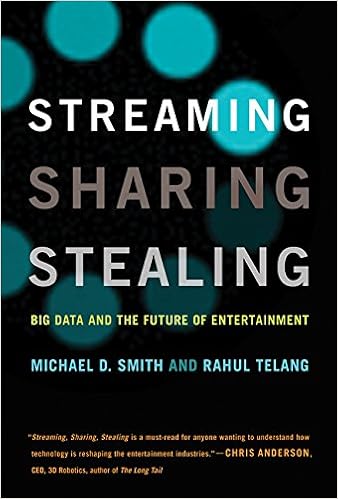
What do the TV series House of Cards, Moneyball pitcher Chad Bradford, women’s erotica purchases, You Tube Spaces and Harrah’s casinos have in common? I will explain in a moment, as you mull over each of these situations.
In a new book entitled, Streaming, Sharing, Stealing: Big Data and the future of entertainment, two Carnegie Mellon professors present years of researching the book publishing, movie-making, television and music industries and how they treat their customers, their artists, and their data. Their conclusions will both surprise and delight you, and I would urge you to buy this book and read it carefully.
Let’s go back to our intro. In February 2011 when the producers of the show House of Cards approached several cable TV executives to get their show green-lighted. Political dramas weren’t popular, and the execs passed. As you all know, Netflix acquired the rights to the series, but what you may not know is that they paid the production company $100 million for a two-year commitment for he series, rather than buying a single pilot episode.
Why did they do this? Because they knew exactly what were the viewing habits of their customers. They created multiple trailers to promote the series:
- one for Kevin Spacey fans,
- one for customers that liked “strong female lead actors,” as they characterize those types of movies
- one for fans of David Fincher’s movies,
- and another for the people who had rented the original BBC series on DVDs.
It knew exactly the people who would want to watch the series, because it had all the data about their viewing habits. And we all know what happened: Cards became a hit, and is filming its next season.
The authors question the generally held belief that delaying the release of a movie via DVD rental or online stream hurts sales, or that selling a paperback or ebook hurts hardcover sales. What they found is that there are two separate audiences for content: those that have “crossed over” to the digital world aren’t coming back to the analog world. Delaying an ebook resulted in almost no change in hardcover book sales. Delaying a digital movie release after the physical DVD date could cut digital sales by half. Digital and analog are different products, and operate in different universes. “When digital customers couldn’t find the product they wanted to buy when they wanted to buy it, many of them simply left, and didn’t come back. They are either pirating their content or consuming other types of content on Netflix et al.”
The digital world grew out of a “perfect storm” coincidence of three megatrends: the Internet and better broadband, the rise of digital content such as MP3s and downloadable apps and movies, and lower-cost PCs that were usable and affordable. This created so much turmoil that the existing entertainment industries couldn’t cope.
Take women’s erotica, and other specialty genres in the book-publishing world. These books used to be difficult to find, with only a few stores carrying more than a couple of titles, often hidden on selected shelves. But with Kindles and other ereaders, people can buy what they want without having to show the world their tastes. When the first 50 Shades book was written, it was self-published. Fans through online communities promoted it before it became a blockbuster hit.
What about You Tube Spaces? These are video production facilities that anyone who has a sufficiently large audience can book and use. Think of it as WeWork with a soundstage and digital editing bay, but for free. There are classes on all sorts of production techniques. They are located in major cities around the globe: all with the goal of improving the quality of You Tube videos. (Here is a tour that The Next Web took a few years ago of their LA studio.) Such a thing wouldn’t be conceivable just five or ten years ago.
And then there is Moneyball and the pitcher Chad Bradford. He had a quirky pitching style but incredible power as a pitcher. However, the stats normally used by most baseball scouts didn’t capture his performance, and he was overlooked by most of the teams. Eventually, he was signed by Oakland and delivered for a couple of years. Eventually though the other baseball teams got their Big Data act together and Oakland’s advantage evaporated.
Moneyball illustrates another issue: the culture in tech firms differs from those of the entertainment firms such as major studios or book publishers. “Companies such as Google, Amazon and Apple don’t make gut feel decisions – they make quantitative decisions based on what their data tells them.” Once the digital platforms have learned their customers’ preferences, they can market products directly to them, based on what they watch, read, and listen to. They can design specific promotional campaigns to speak to specific groups, and even target new customers.
One final example is of Harrah’s casinos. Back in 2000, the company was doing well. It operated in more markets, and was very profitable. But the gambling landscape was changing: more casinos were being built across the country, often as destination resorts that included show rooms, luxury-themed shopping malls and five-star restaurants. Harrah’s had to pivot from operating independent casinos to integrating them in a single business that looked closely at its customers’ data and who did what where on its properties. It had to focus on extracting value from that data, and in a way that built customer loyalty countrywide. And contrary to its provincial assumptions of the local property managers, using this central data repository and analytics they were able to increase revenues, promote cross-market players, and design new loyalty programs to increase its overall customer base.
The overall moral of this book: entertainment companies are going to have to take control over the customer interface and their customers’ data if they are going to be successful. It should be required reading for any digital marketer.